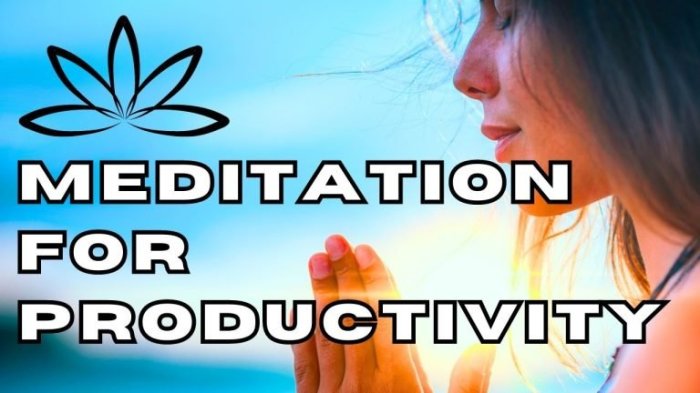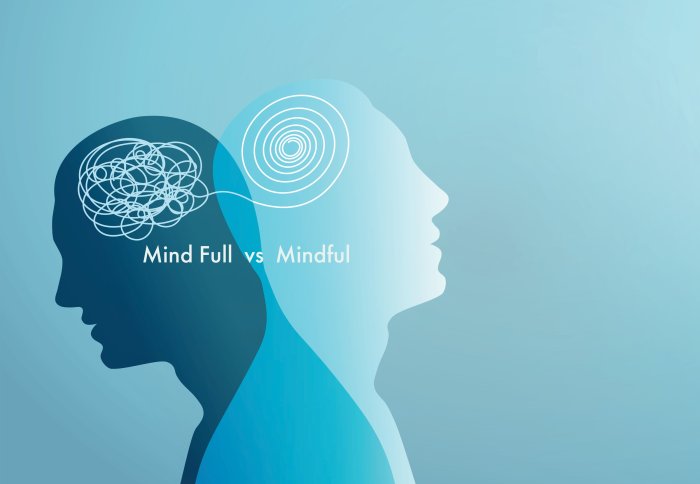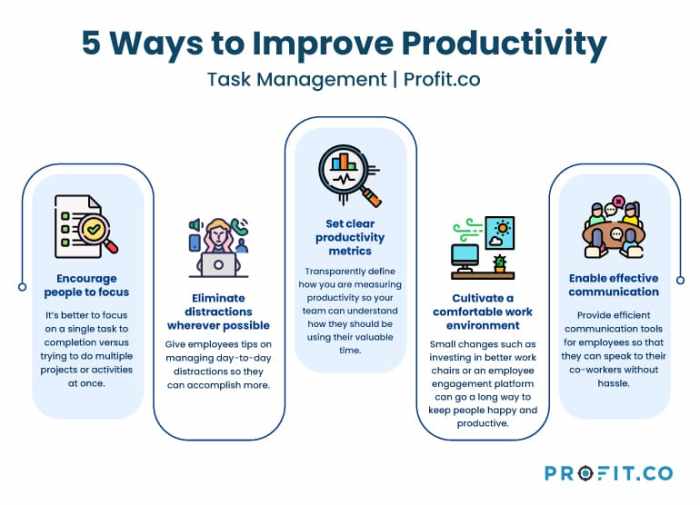
In today’s fast-paced world, maintaining focus and productivity can be a constant challenge. Many individuals turn to various techniques to enhance their cognitive abilities, and meditation has emerged as a powerful tool for improving concentration and efficiency. This exploration delves into the science behind meditation’s impact on the brain, examines practical techniques for incorporating it into daily life, and reveals how meditation can unlock your potential for greater productivity and focus.
The practice of meditation, often associated with relaxation and mindfulness, has gained significant attention for its potential to enhance cognitive function. Scientific research has shown that meditation can positively impact areas of the brain responsible for attention, working memory, and emotional regulation, leading to improved focus, reduced stress, and enhanced cognitive performance.
The Science Behind Meditation and Focus

Meditation isn’t just about finding inner peace; it’s also a powerful tool for enhancing cognitive function, particularly in the realm of attention and focus. Neuroscientific research has shed light on the mechanisms by which meditation practices can improve our ability to concentrate and stay on task.
Meditation’s Impact on Brain Function
Meditation has been shown to influence brain function in several ways, particularly in areas associated with attention and focus.
- Increased Gray Matter Volume: Studies using magnetic resonance imaging (MRI) have found that regular meditation practice can lead to an increase in gray matter volume in brain regions crucial for attention, including the prefrontal cortex, anterior cingulate cortex, and hippocampus. These areas are involved in executive functions, working memory, and emotional regulation, all of which contribute to our ability to focus.
- Enhanced Brain Connectivity: Meditation can also improve the communication between different brain regions. For instance, it strengthens connections between the prefrontal cortex and the parietal lobe, areas involved in attentional control and sensory processing. This enhanced connectivity enables more efficient processing of information and better control over distractions.
- Reduced Activity in the Default Mode Network: The default mode network (DMN) is a network of brain regions that are active when our minds are wandering or daydreaming. Meditation has been shown to decrease activity in the DMN, suggesting that it can help us become more present and less prone to mind-wandering.
Meditation Techniques and Cognitive Control
Meditation practices like mindfulness and concentration techniques directly impact cognitive control and working memory.
- Mindfulness Meditation: This practice involves focusing on the present moment without judgment, observing thoughts and feelings as they arise without getting carried away by them. Mindfulness meditation strengthens the prefrontal cortex, enabling us to better regulate our attention and resist distractions. It also enhances our ability to shift focus between tasks, making us more adaptable in our work.
- Concentration Meditation: This technique involves focusing on a single object, such as a mantra or breath, for an extended period. Concentration meditation improves working memory capacity, allowing us to hold more information in mind at once. It also strengthens our ability to sustain attention for longer periods, crucial for completing tasks requiring sustained focus.
Scientific Evidence of Meditation’s Benefits
Numerous studies have demonstrated the positive correlation between meditation and improved focus and attention.
- Improved Attention Span: A study published in the journal “Nature” found that participants who practiced mindfulness meditation for 30 minutes a day for eight weeks showed significant improvements in their attention span and ability to focus on tasks. They were also less susceptible to distractions and better able to regulate their emotions.
- Enhanced Working Memory: Research from the University of California, Los Angeles, showed that participants who practiced meditation regularly exhibited improvements in working memory capacity. They were able to hold more information in mind and manipulate it more effectively, which is essential for complex tasks.
- Reduced Mind-Wandering: A study published in the journal “Psychological Science” found that participants who practiced mindfulness meditation experienced a reduction in mind-wandering during tasks requiring sustained attention. They were able to stay focused on the task at hand for longer periods, resulting in improved performance.
Meditation Techniques for Enhanced Productivity

Meditation can be a powerful tool for boosting productivity and focus. By quieting the mind and enhancing self-awareness, meditation practices can help individuals improve their concentration, manage stress, and increase their overall efficiency. This section will explore various meditation techniques and provide practical tips for incorporating them into your daily routine.
Mindfulness Meditation
Mindfulness meditation involves paying attention to the present moment without judgment. This practice can help you become more aware of your thoughts, feelings, and sensations, allowing you to observe them without getting caught up in them. Here are some key steps to practicing mindfulness meditation:
- Find a quiet and comfortable place where you can sit or lie down undisturbed.
- Close your eyes and focus your attention on your breath. Notice the rise and fall of your chest or abdomen as you inhale and exhale.
- As you focus on your breath, you may notice other thoughts or sensations arising. Acknowledge these thoughts and feelings without judgment, and gently guide your attention back to your breath.
- Start with short sessions, even just 5 minutes, and gradually increase the duration as you become more comfortable.
Focused Meditation
Focused meditation, also known as concentrative meditation, involves directing your attention to a single object or point of focus. This could be an external object like a candle flame or an internal object like your breath.
- Choose a focal point that is calming and engaging for you.
- Sit or lie down in a comfortable position and close your eyes.
- Focus your attention on your chosen object. Notice the details of the object, such as its shape, color, or texture.
- As your mind wanders, gently guide your attention back to your focal point.
- Practice for a few minutes each day and gradually increase the duration.
Loving-Kindness Meditation
Loving-kindness meditation cultivates feelings of compassion, kindness, and acceptance towards oneself and others. This practice can help reduce stress, promote emotional well-being, and foster positive relationships.
- Begin by focusing on yourself and repeating phrases like “May I be well, may I be happy, may I be peaceful.”
- Gradually expand your focus to include loved ones, then acquaintances, and eventually even people you find challenging.
- Repeat phrases of loving-kindness, such as “May you be well, may you be happy, may you be peaceful” for each person you are thinking of.
- You can also visualize sending loving-kindness energy to these individuals.
Incorporating Meditation into Daily Routines
- Time Allocation: Start with short sessions, even just 5-10 minutes, and gradually increase the duration as you become more comfortable. It’s best to find a consistent time each day, whether it’s in the morning, evening, or during your lunch break.
- Ideal Environments: Choose a quiet and comfortable place where you can sit or lie down undisturbed. This could be your bedroom, a meditation room, or even a park bench. Ensure that the environment is free from distractions, such as noise, light, or movement.
- Potential Challenges: It’s common to experience distractions during meditation. Don’t get discouraged. Simply acknowledge the distractions and gently guide your attention back to your focus.
Step-by-Step Guide for Beginners
Here is a simple meditation technique for enhancing focus and concentration that you can practice as a beginner:
- Find a comfortable and quiet place to sit. You can sit on a chair or cushion, ensuring your spine is straight but relaxed.
- Close your eyes gently and bring your attention to your breath. Notice the natural rhythm of your breath as you inhale and exhale.
- As you focus on your breath, you may notice other thoughts or sensations arising. Simply acknowledge these thoughts without judgment and gently guide your attention back to your breath.
- If your mind wanders, don’t get frustrated. Just gently guide your attention back to your breath.
- Start with a short session, even just 5 minutes, and gradually increase the duration as you become more comfortable.
Productivity and Focus
Meditation, often perceived as a practice for relaxation and stress reduction, plays a crucial role in enhancing productivity and focus. By training the mind to be present and aware, meditation can help us manage distractions, improve concentration, and unlock our full potential in various aspects of life, including work.
Managing Distractions and Enhancing Focus
Meditation cultivates the ability to focus attention on the present moment, reducing the impact of distracting thoughts and external stimuli. By regularly practicing mindfulness, we learn to observe our thoughts without judgment, allowing us to identify and let go of distractions more effectively. This heightened awareness translates into improved concentration and focus during work tasks, enabling us to complete projects with greater efficiency and accuracy.
Mindfulness and Enhanced Decision-Making, Problem-Solving, and Creativity
Mindfulness, a key component of meditation, fosters a state of heightened awareness and clarity. This allows us to observe our thoughts and emotions without getting carried away by them, promoting a more rational and objective approach to decision-making. By reducing emotional reactivity, we can make informed choices based on facts and logic rather than impulsive reactions. Similarly, mindfulness enhances problem-solving abilities by allowing us to approach challenges with a clear mind, facilitating creative solutions and innovative thinking.
Real-World Examples of Successful Meditation Integration
Numerous individuals and organizations have successfully integrated meditation practices into their routines, experiencing significant improvements in productivity and focus. For instance, Google, known for its innovative work culture, has implemented mindfulness programs for its employees, leading to reported increases in employee engagement, creativity, and overall well-being. In addition, research has shown that meditation can enhance cognitive function, improve memory, and boost emotional regulation, further contributing to a more productive and fulfilling work experience.
The Impact of Meditation on Stress and Performance
Stress is a pervasive aspect of modern life, often leading to diminished productivity, impaired focus, and overall well-being. Meditation, a practice that involves focusing the mind on a single point, has emerged as a powerful tool for managing stress and enhancing performance.
Meditation’s Role in Stress Reduction
Meditation’s ability to reduce stress and anxiety stems from its impact on the body’s physiological response to stress. When we experience stress, our sympathetic nervous system kicks in, releasing hormones like adrenaline and cortisol. These hormones prepare us for “fight or flight,” but prolonged exposure can lead to physical and mental strain. Meditation, by promoting relaxation and calming the mind, helps activate the parasympathetic nervous system, which counteracts the effects of the sympathetic nervous system.
This shift in physiological response leads to a reduction in stress hormones, lowering heart rate, blood pressure, and muscle tension.
Meditation and Emotional Regulation
Meditation cultivates emotional regulation, allowing individuals to better manage their emotions and responses to stressful situations. By focusing on the present moment, meditation helps individuals detach from overwhelming thoughts and feelings. This detachment creates space for emotional awareness and understanding, enabling individuals to respond to stress with greater composure and resilience.
Meditation’s Impact on Cognitive Function
Research has consistently demonstrated the positive effects of meditation on cognitive function, including memory, attention, and focus. Studies have shown that regular meditation practice can enhance brain plasticity, leading to improved cognitive flexibility and problem-solving abilities. Moreover, meditation’s stress-reducing effects contribute to improved memory and cognitive function by reducing cortisol levels, which can negatively impact brain health.
Meditation offers a path to unlocking greater productivity and focus, empowering individuals to navigate the demands of modern life with greater clarity and efficiency. By understanding the science behind meditation’s benefits and incorporating practical techniques into daily routines, you can harness the transformative power of mindfulness to achieve your goals and unlock your full potential.
Questions Often Asked
How long does it take to see results from meditation?
The time it takes to experience the benefits of meditation varies from person to person. Some individuals may notice improvements in focus and concentration within a few weeks, while others may take longer. Consistency and regular practice are key to seeing results.
What are some common misconceptions about meditation?
One common misconception is that meditation is only for spiritual or religious individuals. Meditation is a secular practice that can be beneficial for anyone, regardless of their beliefs. Another misconception is that meditation requires hours of practice. Even short sessions of 5-10 minutes can have positive effects.


